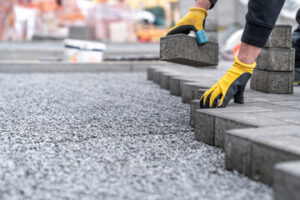Driveway Paving Materials and Costs
When it comes to paving your driveway, there are many options. Understanding which is right for you and your home can save you money and aggravation in the long run. Driveway paving is a significant project that requires careful planning and research for good results. Costs vary depending on the material, installation, and other factors.
 Paving contractors will test the sub-base to ensure it is properly prepared for the new asphalt. A good sub-base will prevent settling and shifting as well as provide stability. Paving Company Charleston SC will lay an asphalt layer on the base. Once the new asphalt is installed, a binder course is added to protect it and provide additional strength. This binder course can be tinted, stamped, or etched to enhance its look and protect it from abrasions.
Paving contractors will test the sub-base to ensure it is properly prepared for the new asphalt. A good sub-base will prevent settling and shifting as well as provide stability. Paving Company Charleston SC will lay an asphalt layer on the base. Once the new asphalt is installed, a binder course is added to protect it and provide additional strength. This binder course can be tinted, stamped, or etched to enhance its look and protect it from abrasions.
Driveway paving costs vary depending on the type of material used and the amount of labor required. It can also depend on the location, size and any changes to the landscape. Paving materials typically come from brick, concrete, gravel, flagstone, cobblestone or pavers. A paver driveway costs more upfront than a poured concrete one, requiring less maintenance and can last twice as long.
Another popular choice is asphalt, which can be installed with colors and stamped patterns and can last up to 30 years. It is more durable than paved stone and does best in colder climates. Gravel is the cheapest of the paving options and it is an excellent choice if you have a large, long driveway. However, it can deteriorate easily in areas with frequent rains and may require regular maintenance such as raking or new gravel filling.
When deciding on the best driveway paving material for your home, you must consider costs, durability and appearance. Most homeowners choose between asphalt, concrete or gravel paving materials. If you’re a do-it-yourselfer, it’s important to understand the installation process. The paving material you choose for your driveway must withstand heavy traffic and weather conditions.
Before laying asphalt or concrete, a sub-base is created. This base may consist of a layer of soil that is cleared and compacted or it could be made up of crushed rock. Driveway paving is a great way to beautify your property and increase the value of your home. However, this type of paving must be done properly to provide a long-lasting and durable surface.
First, the sub-base needs to be prepared. This involves installing a layer of gravel or sand thick enough to absorb all the water coming in contact with it and prevent flooding. The sub-base should be prepared according to your area’s soil type and drainage conditions. The sub-base must also be laid, graded, and compacted correctly to provide a stable base for the new asphalt to be placed on top of.
This step is important, because it determines how well the new driveway will hold up to traffic and weather over time. A sub-base that is too thin can cause the new asphalt to flex and crack, while one that is too thick will not support the new material and will fail before it has a chance to properly bond.
Driveway paving is a cost effective solution for enhancing the appearance of your property. However, it requires regular maintenance to keep it looking its best.
The first step in your paving routine is to thoroughly clean the surface. This includes removing any moss or weeds that have grown over the paving. Using soapy water and a stiff bristled brush, scrub the paving. Rinse well and allow it to dry in the sun.
Another thing to do is to top up the joints between the paving slabs with jointing sand. This prevents the paving slabs from shifting as they deteriorate. Asphalt driveways need to be inspected regularly during winter and summer to ensure they don’t develop any cracks. These can lead to additional damage and increased pavement maintenance costs.
Driveway paving is the process of installing a hard surface on a driveway area to provide a durable and stable surface for vehicles to drive and park on. This can involve using various materials such as asphalt, concrete, or interlocking pavers, depending on the desired appearance, durability, and budget. The process typically involves removing any existing materials and preparing the ground surface to ensure a level and stable foundation. The chosen paving material is then installed, and finishing touches such as edging and sealing may be added to ensure a polished appearance and improve the longevity of the surface. Driveway paving can add curb appeal and value to a property, as well as improve accessibility and safety for vehicles and pedestrians.